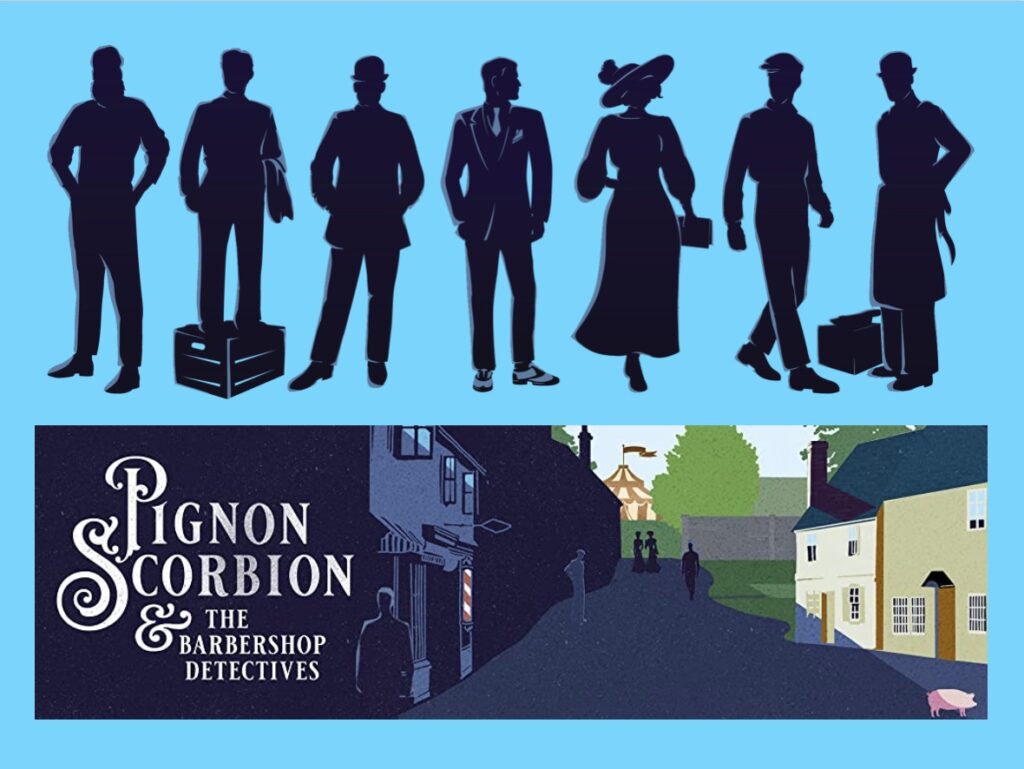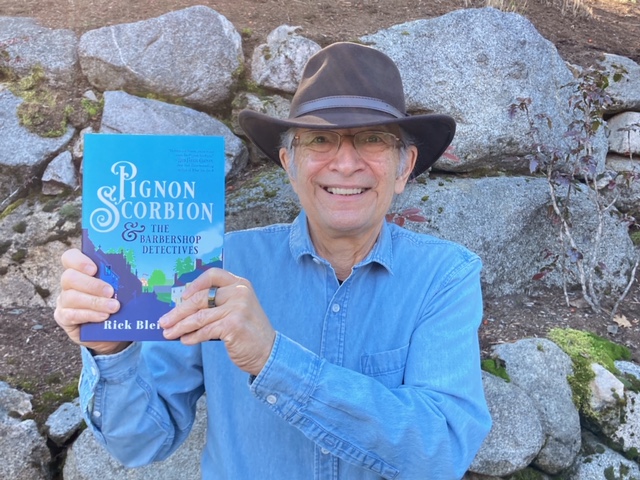Rick Bleiweiss–author, publishing executive, and producer–published his first novel, Pignon Scorbion And The Barbershop Detectives, this past February. Downtown had the opportunity to sit down with Rick and discuss all things Pignon, publishing, and craft.
You’ve just released your debut novel. What is it about? What do you want readers to know?
Well, the book takes place in 1910 in a country-side English town. A fictitious town called Haxford, and it’s in the Downton Abbey era, so that kinder, gentler era than possibly the one we’re living in at present. And Haxford has a new police chief inspector come to town called Pignon Scorbion, and he happens to be former friends with the owner of Brown’s Barber Shop, Calvin Brown. And they renew their friendship. Back when Calvin was an apprentice and Scorbion was a constable in another town, Calvin helped him solve a crime, and they did it in the barber shop back there, so when Scrobion comes to Haxford and renews his friendship with Calvin, Scorbion starts solving his new cases in the barber shop assisted by Calvin, the barbers, the shoe shine man, a young newspaper reporter, and a brilliant female bookshop owner.
There are three crimes in the book, three mysteries: a fortune seeker, a murder at a circus, and a crime of passion. I’ve written it very much in the style of Agatha Christie’s Hercule Poirot and Sherlock Holmes. It’s a classic throwback who-done-it. There’s humor in it. There’s mystery in it. And it gives people entertainment and escape from today’s stresses.
What was the publishing process like as a debut author?
For full transparency, I’ve been, since 2007, the head of business development for a publishing company, Blackstone Publishing. They’re the company who published the book, however, when my agent went out with it, it received offers from multiple publishers, so it wasn’t just a mercy publishing, nothing like that!
I got an agent, Nicole Resciniti, she owns the Seymour Agency, and she loved the book, went out with it. We got multiple offers, and Blackstone really wanted the book, they had it read by their reviewers, and they loved it. And I wanted to be there; it felt right to me, if you will. I love the company, I think they’re great. So that’s how it came about.
In terms of the launch of the book, I spent a lot of my career in the music industry up until about 2002, for maybe 50 years before that, and so I learned a lot over the course of my career about how to launch albums and soundtracks. What I did was I took a lot of the information that I learned there and applied it to the launch of Scorbion because I think Scorbion can be a brand in the same way Hercule Poirot is a brand and Sherlock Holmes is a brand.
We did a multi-book deal; I just turned in the second book, and I’ve started writing the third one already. I did a multi-sensory launch, if you will, with a video trailer. I had a video game created that’s on the Google and Apple app stores. I did an author logo. I did a theme song for him. I created a YouTube channel. I did contests. I did t-shirts, and merchandising, so I sort of said, “Okay. Let’s do this as a not-totally-typical book launch and get people’s attention on various platforms.”

What is your long-term goal with this book? What about the sequels? Do you want to take this to Hollywood?
First of all, I’m very pleased to tell you, as of about two days ago, we signed an option agreement with a UK production company, and they are going to be looking to develop it as a TV show. So fingers crossed!
The second book has three crimes in it as well. It’s called Murder in Haxford, and there’s a client of one of the barber’s who drops dead while having his heair cut, another one with a blacksmith who is killed on the way home from helping a friend birth some calves, and then there is a hot airballoonist who is shot and killed while up in the balloon alone and nobody can figure out how he was killed when he was up in a hot air balloon.
And the third book, which I’ve started writing, is about a young magician who stumps every other magician, but while she’s doing her magic in theaters, robberies are happening, and she’s identified as the one doing the robberies, but she can’t be because she’s on stage performing.
You also have a story in an upcoming anthology. What is the story/anthology about?
Hotel California is the first in what’s going to be a series of short story, mystery anthologies. The series is called Murder and Music, and each of the books will have the title of bestselling albums, and I’ve got a story in all of them.
The editor, Don Bruns, came up with the idea. His thought was to create a book where the titles of the stories are the same as the titles of the songs in the albums, but the actual stories don’t have anything to do with the lyrics and content of the songs. There’s some really, really good authors in there. Heather Graham, Andrew Child has contributed a brand new Jack Reacher story, John Gilstrap, Reed Farrel Coleman, Amanda Flower, Jennifer Dornbush, Don Bruns has something in there.
My story is contemporary. It’s called “The Last Resort,” and it’s the story of a premier New York hitman who is sent on a hit, and the hit goes wrong, and it’s actually a hit on his life. He was set up. But he escapes to Maui, and after that setup, the story is the cat and mouse game between him and the hitman sent to finish him off.
How has working in publishing and entertainment helped you launch your first novel?
I did the marketing for the whole soundtrack of This is Spinal Tap, and I did the soundtrack marketing for the first three Star Wars movies, and Saturday Night Fever. And with acts like Kiss and the Backstreet Boys and Pink and Melissa Ethridge, Alicia Keys and others, it gave me an understanding of what you need to do to get the public to pay attention when you’re breaking a new act.
When it came to publishing, I worked with a lot of authors, and I saw what they did to be successful and tried to emulate that. One of the very specific answers to your questions though, is I did a lot of work with Gene Simmons and Kiss back in the day, and Gene was a brilliant marketer. Kiss is one of the most brilliantly marketed entities, not just acts, but entities in the world. And Gene had five business principles, and I really tried to apply them to the launch of my book because it certainly got him where he is with Kiss.
I kind of drew on everything that I learned and saw that worked, and then tried things that other people didn’t try as well.
You’ve had all this experience as a producer and a publishing executive, and now you’re publishing your first novel. So what message or advice do you have to other people that want to do the same thing?
I have a few different things. I have always chased the pot of gold at the end of rainbows. I did it as a producer, I started companies. Some were successful, some failed. And I always found that the chase itself was even more exciting than finding the pot of gold, and so the first piece of advice I would give to people is: follow your dreams. Chase them. Go for it. As Wayne Gretsky, a great hockey player said, “You miss a hundred percent of the shots you don’t take.” And that’s totally true. If you don’t shoot, you can’t score! So go for it!
The second piece of advice: I’m 77. It’s my first published novel. I have advice, not just for seniors, but for younger people as well, and that is, no matter what age you are, you are never too old and never too old to follow those dreams. Age is relative to your energy level and your enthusiasm and your creativity. No matter what age you are, go for it.
In addition to that, I have some specific advice for people who want to be writers. I won’t go through all my advice; it would take more than we’ve got time for! But, I would say a couple of things are really important. One is, don’t get discouraged by rejection. Every person in creative endeavors has somebody that doesn’t like what they do. One of my favorite books was The Girl With The Dragon Tattoo, and there was a reviewer who wrote, “This is the worst book I’ve ever read.” And Harry Potter was turned down by multiple publishers. And they’re just two examples in a sea of examples. You can’t let negativity and rejection get to you. It’s natural. It happens. You can’t please everybody all of the time.
And another thing I would suggest is to figure out what your goals are. Do you want to be a writer as your career? If you do, attack it like a career. If, on the other hand, you just enjoy writing and want to get your books out there and self-publish them and you don’t care how many people read them, it’s a whole different path.
And the last thing I would say is keep writing. If you’re a writer, and you want to write, just keep writing. That’s what writers do. Writers write!

